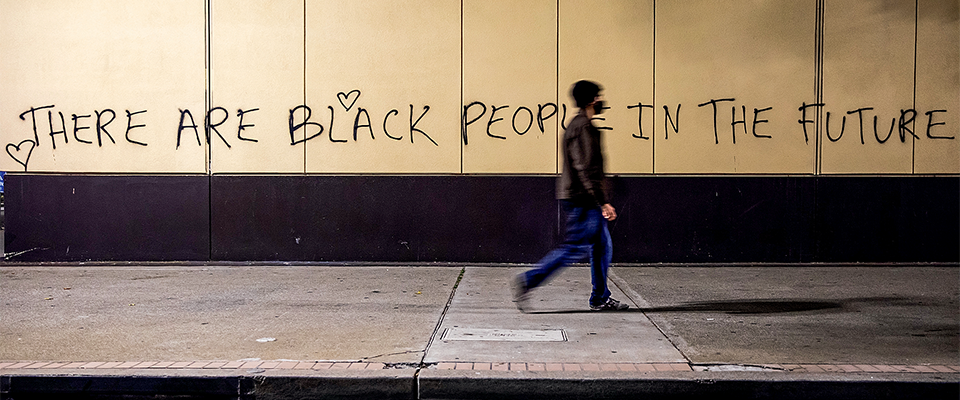The modernist verse of poet and 2020 MacArthur Fellow Fred Moten is like jazz on the page.
When Fred Moten reflects on his childhood, he thinks of music. His mother once slipped a coat over his pajamas, so he could accompany her to a late-night concert by the jazz singer Joe Williams on the Las Vegas Strip. She also played the piano, collected jazz and blues recordings, and baked pies for legendary bluesman B.B. King.
“Her social and political commitments were very much entangled with her cultural and aesthetic commitments, particularly her love of music,” Moten, 58, professor of performance studies at New York University’s Tisch School of the Arts, recalls over Zoom. His work—both dense cultural theory bursting with wordplay and poetry rich in musicality—reflects her abiding influence. One of his poetry collections, B Jenkins, bears her name.
On Oct. 6, Moten, who received a doctorate in English from Berkeley in 1994, was named a MacArthur Fellow, winning a no-strings-attached $625,000 award, to be paid out over five years. Dubbed “genius grants” by the media, the MacArthur Fellowships reward creativity and often favor interdisciplinary pursuits.
Moten’s MacArthur citation praises his “relentless exploration of sound and its importance as a medium of Black resistance and creativity.” It notes that, in Moten’s poetry, such as in the collection The Feel Trio, a 2014 National Book Award finalist, “language hovers at the edge of sense so that sound rises to the fore and the reading of the poem approaches musical performance.”

Drawing on both Black vernacular and the modernism of T.S. Eliot and James Joyce, the poems are fragmentary and infused with references to figures as diverse as the composer Kurt Weill, the theoretical physicist Edward Witten, and the Chicago installation artist Theaster Gates. Moten’s prose works—including In the Break: The Aesthetics of the Black Radical Tradition (2003) and a three-volume set of essays, consent not to be a single being (2017–18)—touch on music, art, philosophy, and politics, and are arguably more cryptic still.
“I don’t mean to be cryptic,” says Moten, who is given to circumlocution and paradox even in speech. “To work at the border and the edge of those things is, also, at the same time, to work in the very heart of those things. … Imagine some image of a whirlwind or a black hole: It’s not that the outside edge of the thing isn’t crucial, it’s just that there’s the inside edge of it, too.”
So, Moten is claiming the right to be obscure? “It’s a right to be obscure,” he agrees, “but it’s an obscurity that’s out in the open—it’s an exposed obscurity.”
Moten’s parents arrived separately in Las Vegas as part of the Great Migration of Southern Blacks to the North and West. His maternal grandmother was a gifted pianist who cooked, cleaned, and took care of the children of a white family. His Louisiana-born father never got past ninth grade but always stressed the importance of education. He worked hard, sometimes two jobs at once: as a laborer at the Las Vegas Convention Center, a casino porter, a bus driver, and a janitor at the Nevada Test Site.
Moten’s mother, from small-town Arkansas, graduated from college and taught at a segregated elementary school in their tight-knit Westside Las Vegas neighborhood. An only child, Moten attended the private Las Vegas Day School, “a little place in the middle of the desert.”
His parents divorced when he was 11. He attended a parochial school in Pittsburgh while his mother pursued graduate studies at the University of Pittsburgh. The two returned to Arkansas when his maternal grandfather became ill, and Moten finished high school there. High standardized test scores and the advocacy of a Black admissions officer who happened to be from Arkansas helped him secure admission to Harvard.

It was not an easy fit. His mother had been a sociology major, and Moten imagined that economics and sociology courses might involve “the kind of liberationist politics that I grew up in.” But, at the Harvard of that era, those disciplines “didn’t really have anything to do with the struggle for Black freedom,” he says.
Moten read widely, but not necessarily for his courses, and acquired an important mentor, government professor Martin L. Kilson Jr., the first Black full professor at Harvard College. “I struggled academically,” Moten says, “but I flourished intellectually. It was just that the intellectual part of it didn’t necessarily coincide with what I was supposed to be doing in class.” His grades suffered, and he was asked to withdraw for a year.
Back in Las Vegas, Moten took a job—like his father before him—as a janitor at the Nevada Test Site. He already knew the work of poets such as Amiri Baraka, Langston Hughes, Paul Laurence Dunbar, and Nikki Giovanni. But during the long bus rides to work, he immersed himself in T.S. Eliot and Dante. The effect was galvanizing. “I shifted from imagining that I was going to be some kind of Marxist sociology professor to being, basically, a Marxist literature professor,” he says.
He returned to Harvard as an English concentrator, studying modern American poetry and publishing his own verse in the Harvard Advocate. His perspective also was shaped by deconstruction, a school of postmodern criticism founded by the French philosopher and UC Irvine professor Jacques Derrida.
When he arrived at Berkeley in 1985, Moten, whose mother took him to his first civil rights protest at age five, says he discerned “echoes and traces of the Free Speech Movement and the Black Panther Party.” His own political involvement included demonstrating in favor of the University’s divestment from companies doing business in apartheid South Africa, helping to establish a graduate student union, and supporting Palestinian activists. Moten’s Berkeley dissertation, on Baraka and his book Black Music, furthered his interest in “those moments where the laws of literary meaning break down.”

Another major influence was his dissertation adviser, Julian C. Boyd, a linguist who called himself a “philosophical grammarian”—in Moten’s words, “someone who sought rigorously to understand the philosophical and psychological implications of grammar.” Even more important, Moten says, was “how good he was to people—how generous and kind.”
In the Break, which moves from the sound of an enslaved woman’s scream to Black resistance more generally, established Moten’s reputation. The book reflects on such disparate icons as Baraka, Duke Ellington, Marvin Gaye, and Emmett Till in prose that flirts with the limits of meaning. “The flipside of fetishistic white hipsterism’s recourse to black authenticity,” Moten writes, “is a white avant-gardism whose seriousness requires either an active forgetting of black performances or a relegation of them to mere source material.”
A decade later, in 2013, he published The Undercommons: Fugitive Planning & Black Study, coauthored with Stefano Harney, a close friend from his Harvard Advocate days. It was a critique of the contemporary university that, according to a 2018 Harvard Magazine article, was passed around campuses like samizdat.
“The university swallows up and tolerates its critics the way a body uses antibodies,” Moten says. His own commitment, he says, is to a broader conception of “social and aesthetic and intellectual life.” The university, by contrast, has been “an institution which is designed to regulate,” he says, “and I’m interested in what it is to resist that regulation.”
Moten has, nevertheless, spent much of his life in academe, alongside his wife, cultural studies theorist Laura Harris, with whom he has two sons. He has taught at UC Riverside, Duke, and the University of Iowa. In recent years, he also has collaborated with artists such as Wu Tsang, a 2018 MacArthur Fellow. In one of their videotaped works, the two read an exchange of their voicemail messages; in another, Moten, in a velvet cape, dances and lip syncs to the song “Girl Talk.”
One common thread in Moten’s poetry and criticism seems to be joy in the possibilities of language. “That’s true,” Moten says, “but what’s also true is it’s pain, too. Because this is writing that’s in and of the Black experience. The mathematics of it is such that it’s not just equal parts pain and equal parts joy—because that would presuppose that the joyful parts and the painful parts are ever separate in the first place. And they never are.”
Julia M. Klein is a cultural reporter and critic in Philadelphia.






















